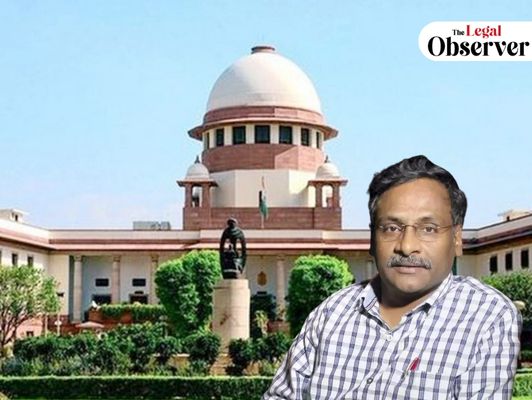The Supreme Court declined to postpone the acquittal of former Delhi University professor G N Saibaba, who was charged with criminal conspiracy under the Indian Penal Code and for having Maoist affiliations under sections of the Unlawful Activities (Prevention) Act (UAPA).
A few hours after the Bombay High Court’s ruling, the National Investigation Agency (NIA) petitioned the Supreme Court for a stay. However, the NIA was permitted to move a request for an immediate listing before the registry.
Saibaba and five other defendants were cleared earlier in the day by the Nagpur Bench of the Bombay High Court, which overturned the life sentence that had been given to them in 2017 by a session court in Gadchiroli, Maharashtra.
Saibaba is currently being held at the major prison in Nagpur and is confined to a wheelchair due to a physical impairment. The five additional defendants in the case were exonerated by the bench after allowing their appeals.
One of the five passed away while the appeal was being heard. The offenders must be released from jail immediately unless they are charged in another case, the bench said.
The acquittal by the Bombay High Court was brought up by Mr Mehta, who also claimed that the offence committed by the person who was exonerated was “severe in nature” and “against the nation.”
The bench was made up of Justices D.Y. Chandrachud and Hima Kohli. “It is a grave offence against the country.” The prosecuting agency had no necessary sanctions, in this case, he continued, so the acquittal was not based on the case’s merits in and of itself. Mr Mehta pleaded with the Apex Court to postpone the acquittal ruling and asked that the case be listed for Monday.
The bench noted that it is a requirement of the law that a sanction for prosecution only be granted after taking into account the report of the independent authority (appointed in accordance with the Act), which is responsible for conducting an independent review of the evidence gathered during the investigation and formulating recommendations.
It noted that the report of the designated authority in the current case gives no aid or assistance to the sanctioning authority, being devoid of reasons or a concise description of the analysis of the evaluation of evidence acquired.
The report of the appointed authority was requested and, regrettably, provided as a ritualistic formality, and we unequivocally hold that the sanctioning authority only gave lip service to the legislative obligation. According to the court’s ruling, the sanction order was poor in law and hence unconstitutional because it violated the legislative imperative.
According to the report, any interference with the due process of law encourages the growth of terrorism and gives entrenched interests, whose sole goal is to spread untrue information, and material to use in their propaganda campaigns.
The penalty order should ideally be self-explanatory and generally include all pertinent information regarding the grounds on which the sanction is being granted. The court stated, “We are inclined to hold that any safeguard, however slight, enacted by law in favour of the accused, must be carefully safeguarded.”
The decision was made by a division bench consisting of Justices Rohit Deo and Anil Pansare from the Nagpur bench. One of the defendants, Pandu Pora Narote, passed away in August 2022. The other defendants are Vijay Nan Tirki, Mahesh Tirki, Hem Keshwdatta Mishra, Prashant Rahi, and Tirki.
Sai Baba and the other defendants are to be released right away, per the court’s instruction. The appellants were represented by Nihalsingh Rathod with assistance from Pradeep Mandhyan, Barunkumar, H.P. Lingayat, and Senior Counsel Subodh Dharmadhikari.
The State was represented by Siddharth Dave, Senior Special Public Counsel, and H.S. Chitaley, Assistant Special Public Counsel.
The judgment stated that this alleged report contained the conclusion without justification and that it was merely a message in the form of a suggestion.
According to the bench, “a laconic communication conveying only the recommendation without a summary or analysis of the review of the relevant evidence is not a report which the legislature intended the appointed authority to submit to the sanctioning authority, and stands on the same footing as the absence of a report. The offenders must be released from jail immediately unless they are charged in another case.”






